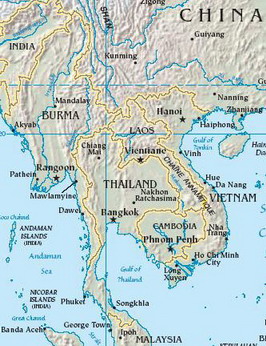Doug Cooper, Co-Director
 The Mon-Khmer Languages project is creating essential research and
reference resources for the Mon-Khmer language family.
The larger subgroup of the Austroasiatic stock (Munda is the other), the roughly 150
Mon-Khmer languages are of great antiquity and extraordinary linguistic interest,
and are of primary importance for the study of Southeast Asian history and culture.
Mon-Khmer languages are the national languages of Vietnam and Cambodia, and are found in communities large and small in India and China, and across broad swaths of Burma, Malaysia, Laos, Thailand, and the Nicobar Islands.
The Mon-Khmer Languages project is creating essential research and
reference resources for the Mon-Khmer language family.
The larger subgroup of the Austroasiatic stock (Munda is the other), the roughly 150
Mon-Khmer languages are of great antiquity and extraordinary linguistic interest,
and are of primary importance for the study of Southeast Asian history and culture.
Mon-Khmer languages are the national languages of Vietnam and Cambodia, and are found in communities large and small in India and China, and across broad swaths of Burma, Malaysia, Laos, Thailand, and the Nicobar Islands.
The project has three focal points (see also the links on the left):
the Mon-Khmer languages database, dedicated to the preservation and
free distribution of language reference materials,
including phonetic transcription, glosses, and citations.
the Mon-Khmer etymological dictionary, which provides an on-line hierarchical
reference that puts the data in context.
It is based on - and is extending greatly, with ten times as many reflexes,
and a dozen intermediate branch reconstructions - the late H.L. Shorto's
Mon-Khmer Comparative Dictionary (2006)
the creation of a collaborative worksite for Mon-Khmer language research -
an an on-line architecture for extension, comment, and correction of language and etymological data.
Our core work - a language database of twenty-four languages from
the twelve Mon-Khmer branches, an etymological 'backbone' that
supports ongoing development, and complete on-line publication
and website support - was within the first two-year funding cycle.
In our second two-year cycle, we are adding languages that represent
all MK sub-branches, as well as adding existing and new branch-level reconstructions.
CRCL and the Mon-Khmer Languages Project gratefully acknowledge the support of the National Endowment for the Humanities, 2007-2009 and 2009-2011. Any views, findings, conclusions, or recommendations expressed in this website do not necessarily reflect those of the NEH.